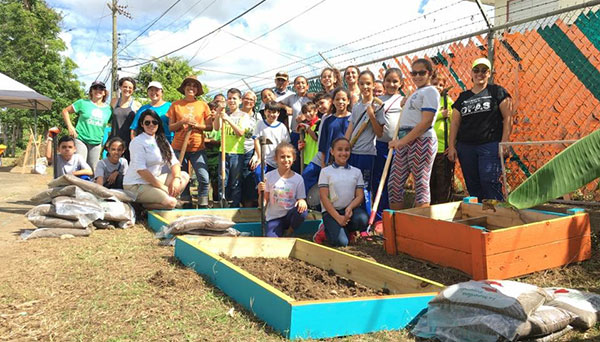Resilient Schools Consortium: Transforming Puerto Rico’s Schools into Hubs for Climate Resilience Education and Solutions
Organization: Organizacion Pro Ambiente Sustentable
To contribute to the sustainable and economic development of the island through educational, entrepreneurship, and community engagement programs.
Location: Municipality of Loiza, Puerto Rico.
Communities directly affected by the project: Escuela Superior Belen Blanco Zequeira and Escuela Intermedia Jesusa Vizcarrondo.
Country: United States
Other Organizations Involved: The National Wildlife Federation, Taller Salud
 @ Organización Pro Ambiente Sustentable
@ Organización Pro Ambiente Sustentable
Background
Puerto Rico, an island community of 3.3 million people, has been battered by climate-fueled storms for decades, yet has not educated or trained future generations to be prepared. There is a critical need to engage Puerto Rican high school students so they will be ready to help their communities adapt to and mitigate the worst effects of climate change, including sea-level rise, extreme weather, and coastal flooding.
Goals
The Organizacion Pro-Ambiente Sustentable (OPAS) and their partner’s goals are to culturally adapt and translate the National Wildlife Federation’s (NWF) Resilient Schools Consortium (RiSC) climate and resilience education program into Spanish for PR. OPAS will pilot the RiSC program, with two schools located in the frontline coastal municipality of Loiza, and develop a set of “Climate Resilience Education Guidelines for Puerto Rican Schools” providing a new model for climate resilience education that can be scaled up and replicated in the rest of the island.
Main activities
The Main activities include adapting, translating, and designing the RiSC climate and resilience curriculum for Puerto Rico’s current geographic, social, cultural, economic, and climate realities. Provide professional development and capacity building for teachers at the participants’ schools. Launch the adapted curriculum as pilot projects in the two schools selected, integrating workshops, field trips to sustainable projects on the island, and small-scale resilience projects development by students. Provide emergency preparedness training for students and staff. Conduct a program evaluation and draft Climate Resilience Education Guidelines for Puerto Rican Schools to be presented to the Department of Education for review.
Outcomes
A pilot project will be established at two schools in Loiza, with six teachers engaged. The RiSC curriculum has been adapted and translated for Puerto Rico by a cross-cultural team. Participant teachers will have been trained to implement the adapted RiSC curriculum. Forty students and six teachers will meet for 20-25 weeks of workshops and activities that will increase their climate and resilience knowledge. The RiSC pilot project’s students will complete two small-scale resilience projects and the project’s students and teachers will share their learning through community presentations that will reach two hundred people. The RiSC pilot project’s students and teachers will have achieved certification in emergency preparedness by the State Office of Emergency Management. A preliminary set of Climate Resilience Education Guidelines for Schools will have been designed and presented to PR Department of Education.